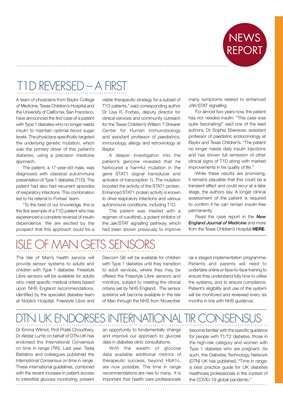
NEWS
A team of physicians from Baylor College
of Medicine, Texas Children's Hospital and
the University of California, San Francisco,
have announced the first case of a patient
with Type 1 diabetes who no longer needs
insulin to maintain optimal blood sugar
levels. The physicians specifically targeted
the underlying genetic mutation, which
was the primary driver of this patient's
diabetes, using a precision medicine
approach.
The patient, a 17-year-old male, was
diagnosed with classical autoimmune
presentation of Type 1 diabetes (T1D). The
patient had also had recurrent episodes
of respiratory infections. This combination
led to his referral to Forbes' team.
"To the best of our knowledge, this is
the first example of a T1D patient who has
experienced a complete reversal of insulin
dependence. We are excited by the
prospect that this approach could be a
The Isle of Man's health service will
provide sensor systems to adults and
children with Type 1 diabetes. Freestyle
Libre sensors will be available for adults
who meet specific medical criteria based
upon NHS England recommendations,
identified by the specialist diabetes team
at Noble's Hospital. Freestyle Libre and
NEWS
REPORT
viable therapeutic strategy for a subset of
T1D patients," said corresponding author
Dr Lisa R. Forbes, deputy director for
clinical services and community outreach
for the Texas Children's William T Shearer
Center for Human Immunobiology
and assistant professor of paediatrics,
immunology, allergy and retrovirology at
Baylor.
A deeper investigation into the
patient's genome revealed that he
harboured a harmful mutation in the
gene STAT1 (signal transducer and
activator of transcription 1). The mutation
boosted the activity of the STAT1 protein.
Enhanced STAT1 protein activity is known
to drive respiratory infections and various
autoimmune conditions, including T1D.
The patient was treated with a
regimen of ruxolitinib, a potent inhibitor of
the Jak/STAT signalling pathway, which
had been shown previously to improve
many symptoms related to enhanced
JAK/STAT signalling.
For almost two years now, the patient
has not needed insulin. "This case was
quite fascinating!" said one of the lead
authors, Dr Sophia Ebenezer, assistant
professor of paediatric endocrinology at
Baylor and Texas Children's. "The patient
no longer needs daily insulin injections
and has shown full remission of other
clinical signs of T1D along with marked
improvements in his quality of life."
While these results are promising,
it remains plausible that this could be a
transient effect and could recur at a later
stage, the authors say. A longer clinical
assessment of the patient is required
to confirm if he can remain insulin-free
permanently.
Read the case report in the New
England Journal of Medicine and more
from the Texas Children's Hospital HERE.
T1D REVERSED - A FIRST
Dexcom G6 will be available for children
with Type 1 diabetes until they transition
to adult services, where they may be
offered the Freestyle Libre sensors and
monitors, subject to meeting the clinical
criteria set by NHS England. The sensor
systems will become available in the Isle
of Man through the NHS from November
ISLE OF MAN GETS SENSORS
via a staged implementation programme.
Patients and parents will need to
undertake online or face-to-face training to
ensure they understand fully how to utilise
the systems, and to ensure compliance.
Patient's eligibility and use of the system
will be monitored and reviewed every six
months in line with NHS guidance.
Dr Emma Wilmot, Prof Pratik Choudhary,
Dr Alistair Lumb on behalf of DTN-UK has
endorsed the International Consensus
on time in range (TIR). Last year, Tadej
Battelino and colleagues published the
International Consensus on time in range.
These international guidelines, combined
with the recent increase in patient access
to interstitial glucose monitoring, present
an opportunity to fundamentally change
and improve our approach to glucose
data in diabetes clinic consultations.
With the wealth of glucose
data available additional metrics of
therapeutic success, beyond HbA1c,
are now possible. The time in range
recommendations are new to many. It is
important that health care professionals
DTN UK ENDORSES INTERNATIONAL TIR CONSENSUS
become familiar with the specific guidance
for people with T1/T2 diabetes, those in
the high-risk category and women with
Type 1 diabetes who are pregnant. As
such, the Diabetes Technology Network
(DTN) UK has published, "Time in range:
a best practice guide for UK diabetes
healthcare professionals in the context of
the COVID-19 global pandemic."